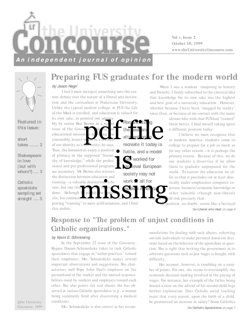Why the little boy is more apt than the dwarf
by Richard W. Cross
In his letter on the manner of reading the ancients, Jules van Schaijik is discomfited with Michael Waldstein sitting on the lap of St. Thomas. Mr. van Schaijik would fashion us all better suited to standing on Thomas’ shoulders, taking advantage of the view that such a vista would provide and using it as a staging ground for criticism.
“If I have seen further, it is because I was standing on the shoulders of giants.” This is a reference penned in 1675 by Isaac Newton in a letter to fellow scientist Robert Hooke. He was referring to the fact that without Galileo’s and Isaac Barrow’s great genius, his own work in theoretical physics, which was gathering world acclaim, would not have been possible. Newton also exclaimed that he viewed the edifice of his monumental Principia Mathematica to have been nothing more than a “grain of sand” on the beach of nature, or some similar allusion. The Principia was of course the first treatise of its kind on theoretical physics. Even today, the student of physics who comprehends the Principia truly is standing on the shoulders of a giant.
When students of physics read Newton, it is within the realm of probability (not just possibility) that they will come to grasp the significance of the work, more or less in its entirety. With such a grasp of the matter, and recognizing that they themselves did not make the discovery, but benefited from it and incorporated it into their thinking, they can say with some confidence that they stand on the shoulders of giants. They benefit from their predecessors but see, perhaps, a little further out. This is a characteristic of much of physical science, be it physics, biology, or chemistry, and it is this factor which accounts for the progressive character of the sciences. Knowledge is incremental, and builds on prior knowledge, even in the event of a theoretical revolution, as was the case with Einstein’s theory of relativity, which modified the scope of the Principia.
With these brief thoughts as a preamble, I suggest that Mr. van Schaijik discloses some misunderstanding of both Newton’s metaphor and its use by Dr. Waldstein. The mode of understanding in the sciences is rather different from the mode of understanding in philosophy. Philosophical truth is not so much comprehended, as in the sciences, but contemplated. To be sure, there is understanding in philosophy; the truth can be achieved, but it is after many fits and starts, and “fraught with many errors” as St. Thomas put it. For this, the metaphor of sitting in Thomas’ lap is much more apt since it suggests that the beholder, the child, does not completely comprehend what it is that has been put before him, except perhaps after many years and considerable effort and reflection.
To be sure, there are some philosophers whose views are not as penetrating, and whose works can be comprehended—in the manner of the physics student comprehending the master. But when contemplating the likes of Thomas, Plato, Aristotle or Augustine, I would suggest that those students are few and far between who comprehend their thinking on any central issue.
There are two signs of the problem of comprehension. One is that students can continually return to these works and rediscover in ever deeper ways what they thought they had mastered long before. This is not simply a matter of vague memory or poor criticism on the part of the students, nor of poor writing or cultural context on the part of the author. It is rather a question of fundamental insight. The other sign is that the criticism of the master always carries with it the considerable risk of chopping at the roots of one’s own cherished presuppositions. The line between the subjective and the objective in the sciences is rather well defined, but hard to find in philosophy.
To be sure, there are the few elect. Perhaps St. Thomas stood on the shoulders of Aristotle. But I would rather demur with Dr. Waldstein and sit in Thomas’ lap. That way I am not so likely to get dizzy and fall.
Richard W. Cross, Ph.D.Associate Professor ofPsychology


